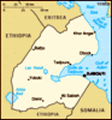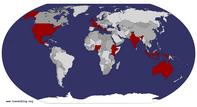Advertisement
Published: February 14th 2010
We were enveloped in a disruptive blackness. Somewhere, in the Horn of Africa, our carriage rested, while inside our bodies contorted uncomfortably on plastic benches. Supposedly, this was First Class. But our butts, backs and remaining body parts disagreed in Western fashion as the hours of darkness slowly ticked intermittently between quick slumbers of exhaustion. One person stirred, which caused a domino effect of passengers waking, rustling, and repositioning themselves into something vaguely tolerable.
Outside was more of the same. Shouts of Afar and Somali traveled in chaotic yellow beams of flashlights that sliced into the night air. Above, the skies were clear as stars glistened in their full desert regalia. They encircled a waning moon that reflected what little light there was, forming silhouettes of the surrounding landscape. We were found in the middle of a moon-like terrain of barren rock cast across a few craggy knolls.
I opened my eyes wider, shifted from one numb butt cheek to the other, and pulled a blanket over my shoulders. I was beyond drowsy. In fact, I was at the point where operating a vehicle would be certain suicide, and most likely resultant homicides. But as I peered out the
barred metal window and felt the cool breeze blow across my face, I saw movement. First, people were hurrying toward their cars with urgency. They were shouting, ordering, jumbling gibberish in languages without pause. Individuals began to board and take their seats; on benches, USAID canvas sacks, filthy floors and gritty aisles, narrow armrests and even luggage racks above our heads. What was a train of silence suddenly erupted into a frenzy of fear. Next, I felt what we were each praying for: metal grinding upon metal as forward progress resumed in a jerky motion along the tracks.
It was the Ethiopian border and for approximately four hours the train remained immobile. People needed their passports, visas, exit stamps and a thorough investigation of luggage, merchandise and belongings by unidentifiable officials asking for money in the midst of darkness. It all made little sense: the processes, the order, the time wasted and the time lost. People were everywhere with their possessions, which appeared identical and were amassed wherever space permitted.
But what mattered was we were moving, crossing the Ethiopian border into Djibouti after being on the country’s only railway for over twelve hours. We were three-fourths of
the way there. We had to keep reminding ourselves when we were not unconsciously lost in a faraway dreamland that we were closer then we had ever been. And yet from the Ethiopian side of customs, we shortly arrived to the Djiboutian side of customs to only discover another segment of time gone by sitting, waiting, contorting, complaining, cursing and half-ass sleeping the experience away.
This was the one and only train in all of Ethiopia. The only operating and functioning train service. Upon learning of its existence, a few of us were set on the experience.
Henry looked over at me, “Apparently the trip takes thirteen hours.”
“That’s not what I heard.” Ivy had another source. “It’s anywhere from twelve to twenty.”
Well, they were both wrong. On the morning of our departure from Dire Dawa in Ethiopia’s eastern desert, our traveling pod of adventurers rose at 6AM, crossed the street from the Makonnen Hotel to the train station at 7AM, proceeded to wait two hours until 9AM boarding (at which time the train was scheduled to leave), and succumbed to further patience for another two hours until the journey eventually began. Then we rolled,
maxing out at 35 kilometers per hour (roughly 21mph) and went through moonscapes of scraggly rock, parched earth, flat deserts dotted with boulder-sized termite mounds and inconceivable towns located in the middle of Narnia. There would be absolutely nothing except dirt combed by sun and wind, and then suddenly a town of decrepit granite would appear like apparitions from the Stone Age.
Worst of all, we were unprepared. Typically at a train stop, whether at a designated station or in a town with a population exceeding five, there were usually options for sustenance: food, water, tea stall, donkey ride, and more. However, to our grumbling stomachs of astonishment there was nothing. No food vendors passing through the carriages. No water bottles without seals broken. No portable
shai (tea) women toting plastic mugs and cups. Nothing. So we rationed. We counted our last crumbs and announced the last droplet of water from our bottles. Then we waited and waited and fell asleep in hunger.
Djibouti Ain’t Djibouti-licious Desert, towns, mischievous youths cursing foreigners, more desert, nightfall, darkness, Ethiopian border, customs, Djibouti border, customs, darkness, sunrise, moonscapes and atlas Djibouti City. It was 8AM. Our trip began 26 hours
ago at 6AM the previous morning. We needed a hotel.
Djibouti City is neutral. Military vehicles from the stretches of Europe to the expenditures of America and across the plains of the Asian steppes roll through traffic circles. Muslims, Christians, pasty Westerners and tan Orientals suck in sweet juices and gorge on fish. Djibouti is the stomping ground for the Middle East. It enables instant access to Yemen, Sudan, and other desert lands to be spied, inspected and shelled. That being said, as fatigues and jeeps stacked with rotating M16s maneuver through the afternoon gridlock, prices skyrocket while shorthaired men and women pushing foreign currency open their wallets for seafood, gelato, pricy swimming pools and accruing bar tabs.
Our reason for traveling to Djibouti, other than spending too much money and riding the gruesome train, was to renew our Ethiopian visas. So, first things first, in a cool marble-laden room, and after the initial papers and precautionary questions, three of us secured our six-month multi-entries and then dispersed into the heat.
Expectations: Djibouti is smokin’ hot lying at the edge of the Red Sea and between the deserts of the Sahara and the Middle East.
The
Reality: Djibouti is like any other dry climate, nothing special, nothing extreme.
Mohammed owned the building where our base in the Djibouti Hotel sat. He was from the country, moved to Norway, but returned for the lifestyle. I asked him about the weather. “Two weeks ago,” he began, “It was so so cold. Sweaters and jackets all in the streets.” I imagined a cold spell for the Death Valley. “But now it is just cold with long sleeve. The weather is getting stranger and stranger. I don’t understand. Sometime really hot, and then next week sometime really cold.”
“And what of Norway?” I pressed.
Mohammed was pouring a liter of coke into a thermos filled with Jack Daniels. “Norway is farthest from hot and beyond cold.”
No matter what Djiboutians thought, the weather was tropical. We walked. We were hot. We perspired and eventually sought the refuge at the most expense swimming pool south of Casablanca. For $60, Lily and I afforded us a 3-hour dip in the pool and a quick float in the swells of the Red Sea. With all the travel, the micromanaging, the bumps and bruises and stresses and confusions, the azul-tiled
eclipse pond overlooking a port called Djibouti rejuvenated our battered souls.
And what else of Djibouti? Nothing besides locals opposed to photographs, the arches of the European Quarter and the wooden pillars of the African Market. We wandered the streets at 2PM when all commerce, movement and evolution froze under the daily spell of freshly arrived
chat from Ethiopia, and we got lost in the mazes of narrow alleyways filled with textiles, fabrics, over-sized garments and Taiwanese-made plastic waste. We bought supplies for food and then promptly left, visas in hand, water bottles full and expectations weary.
Reversing the Toll Roads It was 4:30AM and we were on the side of the road waiting for our bus. Another early morning as we boarded, waited and sweated in the rising heat. Then we shifted as our return journey commenced.
Opting out of the train, instead we caught a bus to the Djiboutian customs, crossed the border and unloaded on the Ethiopian side. Hours wasted, waiting, wondering, until packed like sardines with no concern for the paying fare, our transportation departed. Thus the most uncomfortable bus journey jostled for ten hours down a gravel road paralleling the railway
we rode three days prior. The same termite mounds. The same desert, towns, curious locals and security checkpoints, including the ionizing remains of three Soviet tanks leftover from the Derg Invasion of 1972-‘89.
Dire Dawa came, then Dire Dawa went with an overnight minibus adventure to our starting point in Addis Ababa, which suddenly transformed into the most comfortable, loving, easy-going, nonchalant city in all of Africa. A final taxi ride at 5AM after eight days of travel brought us home to our beds safe and sound, despite the obvious intoxication of our driver. Our African Toll Roads paid and passed, we crashed and spent the entire day in bed.
This blog will be discontinued. To follow more travel articles and cultural photographs, please visit www.cameronkarsten.wordpress.com and subscribe to the RSS Post to receive updates. Thank you for your support.
Advertisement
Tot: 0.29s; Tpl: 0.02s; cc: 15; qc: 24; dbt: 0.2124s; 1; m:domysql w:travelblog (10.17.0.13); sld: 1;
; mem: 1.1mb






















mom
non-member comment
wild
What a journey... I got tired, dirty and hungry reading about it! OXOX, Mom ps. love your pics, good to see you and Alazar.